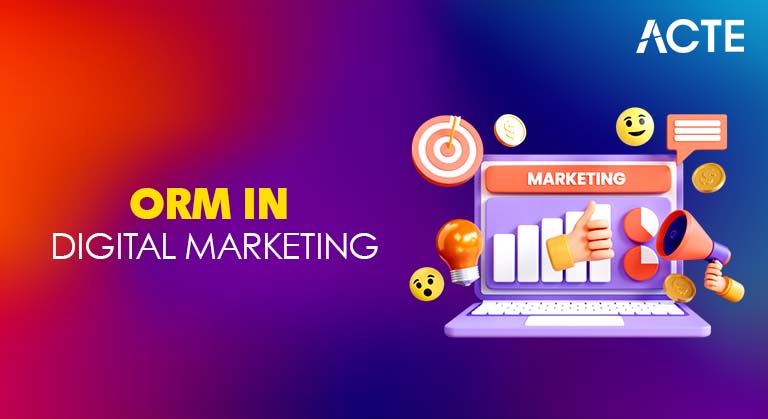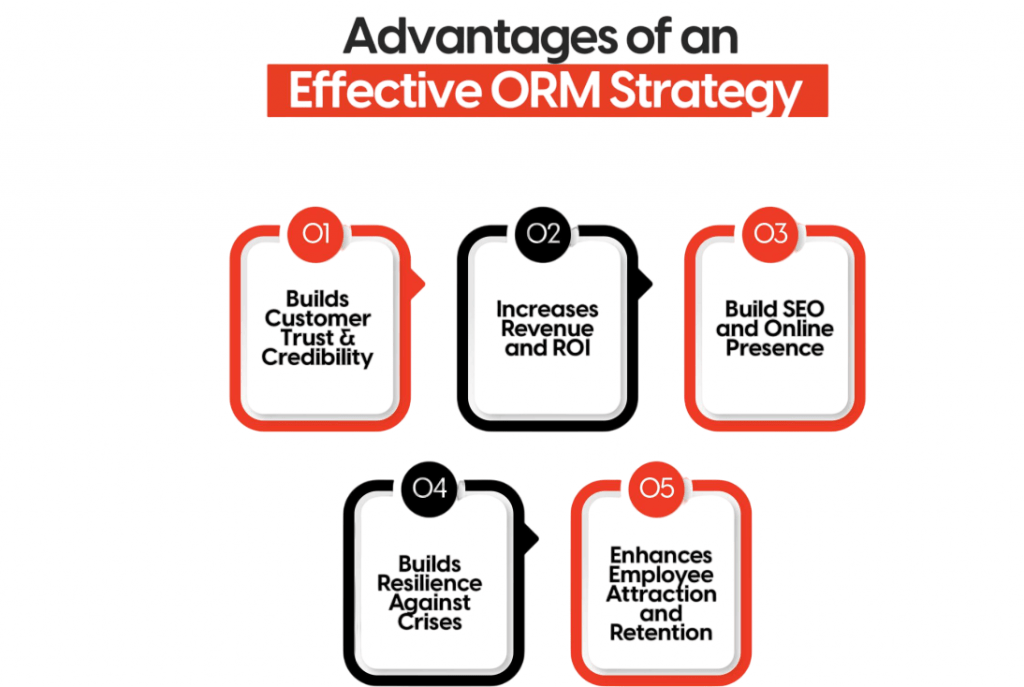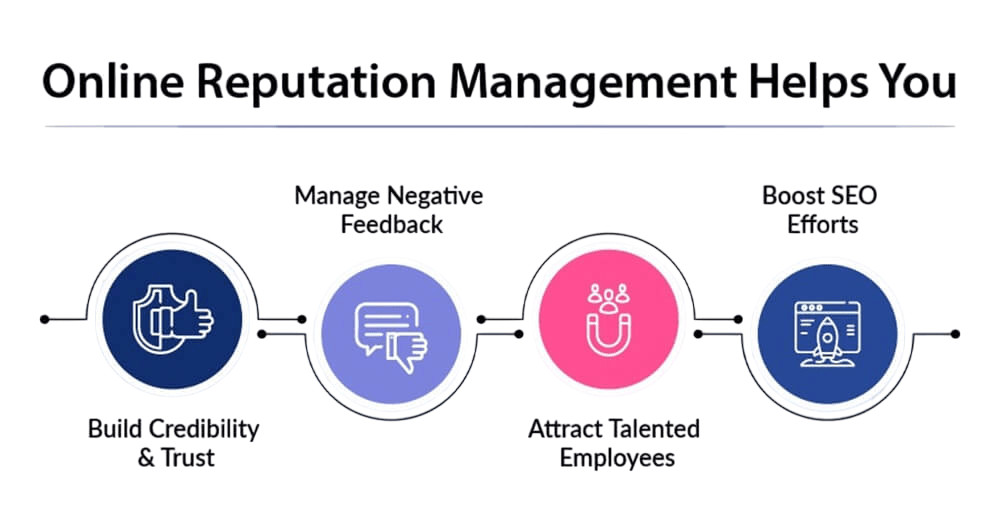
- ORM in Digital Marketing
- What Does ORM Stand For?
- The Importance of ORM in Digital Marketing
- How ORM Works
- Core Components of Online Reputation Management
- ORM vs Reputation Management
- Strategies for Effective Online Reputation Management
- Benefits of ORM for Businesses
- Common Challenges in ORM
- Real-World Examples of ORM Success
- How to Build a Successful ORM Strategy
- Future Trends in ORM
ORM in Digital Marketing
In the digital era, a company’s reputation can make or break its success. With consumers increasingly relying on online reviews, social media conversations, and search engine results, managing how your brand appears online is critical. This is where Online Reputation Management (ORM) comes into play, a vital aspect of digital marketing that protects, monitors, and enhances your brand’s online image an essential discipline covered in Digital Marketing Training, where learners master review management, sentiment analysis, and proactive brand positioning to build trust, credibility, and long-term consumer loyalty. This blog explores what ORM means, why it’s essential, the key strategies, tools involved, and how businesses can leverage it to build trust, credibility, and long-term success.
Ready to Get Certified in Digital Marketing? Explore the Program Now Digital Marketing Online Training Offered By ACTE Right Now!
What Does ORM Stand For?
ORM stands for Online Reputation Management. It refers to the process of monitoring, influencing, and controlling the public perception of a business, individual, or brand on the internet. ORM aims to shape the narrative consumers find about you online by addressing negative content, promoting positive information, and actively engaging with your audience. This process is important for success especially in professional branding contexts like PMP Certification Cost, where reputation plays a key role in career advancement. Certified professionals often invest in reputation management to ensure their credentials are discoverable, trusted, and aligned with the leadership image they project across digital platforms. It helps attract new customers and keeps existing ones loyal. ORM is the practice of managing your online identity. It makes sure your digital story reflects your goals. It involves engaging directly with your audience. This builds stronger relationships and shows you care about feedback. ORM helps control the online conversation, allowing you to guide it positively. Negative content can harm a brand quickly, so ORM works to reduce this impact. It replaces harmful content with useful information, building confidence in your offerings. ORM is crucial for long-term growth. It ensures a steady and positive brand message.
The Importance of ORM in Digital Marketing
In the age of instant information and social media, consumers can access a vast amount of data before making decisions. A few negative reviews or viral complaints can damage your reputation significantly, affecting sales, partnerships, and recruitment risk factors addressed in Digital Marketing Job Description, where professionals are expected to manage online sentiment, monitor brand mentions, and implement reputation management strategies that safeguard trust, mitigate crises, and align public perception with business goals.
Key reasons why ORM matters include:
- Customer Trust: A strong reputation builds trust and influences purchasing decisions.
- Crisis Prevention: Quickly addressing negative feedback prevents escalation.
- Search Engine Impact: Positive content ranks higher, pushing down negative search results.
- Competitive Advantage: Brands with better online reputations often outperform competitors.
- Employee Attraction: Potential hires research company reputations before applying.
- Search engine results (Google, Bing)
- Social media platforms (Facebook, Twitter, Instagram, LinkedIn)
- Review sites (Yelp, Trustpilot, Google Reviews)
- Forums and blogs
- Listening: Using tools to gather data on brand mentions.
- Analyzing: Assessing sentiment and identifying patterns.
- Engaging: Responding to feedback professionally.
- Improving: Adjusting business practices based on insights.
- Promoting: Sharing positive content and encouraging reviews.
- Active Listening and Monitoring: Use tools like Google Alerts, Mention, or Brandwatch to stay updated.
- Quick and Transparent Responses: Respond promptly to both positive and negative feedback with sincerity.
- Encourage Positive Reviews: Create programs or incentives for happy customers to share experiences online.
- Content Marketing: Develop blog posts, testimonials, and case studies that highlight your strengths.
- Social Media Engagement: Maintain an active presence and foster community trust.
- SEO for Reputation: Optimize content so that favorable pages rank higher in search results.
- Crisis Management Plan: Have a predefined process for handling PR crises or viral negativity.
- Enhanced Brand Image: Builds a trustworthy and positive online presence.
- Improved Customer Loyalty: Customers appreciate transparent communication.
- Higher Conversion Rates: Positive reputation influences buying decisions a dynamic often undermined by Black Hat SEO, where unethical tactics like keyword stuffing and link manipulation can mislead users and erode brand trust.
- Reduced Negative Impact: Early detection minimizes damage from negative content.
- Better Search Engine Rankings: Favorable content outranks harmful or irrelevant pages.
- Competitive Edge: A strong reputation attracts partnerships and talent.
- Volume of Data: Managing large amounts of brand mentions can be overwhelming.
- Speed of Response: Digital conversations happen fast, requiring quick action.
- Fake Reviews: Identifying and managing fraudulent content is difficult.
- Negative Content Permanence: Removing or suppressing harmful content is often complicated.
- Resource Allocation: Small businesses may lack dedicated ORM teams.
- Maintaining Authenticity: Overly polished responses can come across as insincere.
- Step 1: Define Your Goals: Understand what you want to achieve, brand awareness, lead generation, crisis prevention.
- Step 2: Identify Key Platforms: Focus on channels your customers frequent most.
- Step 3: Set Up Monitoring Systems: Implement tools for continuous listening.
- Step 4: Develop Response Protocols: Create guidelines for tone, timing, and escalation.
- Step 5: Produce Positive Content: Publish stories, testimonials, and useful information regularly.
- Step 6: Train Your Team: Ensure staff understand ORM importance and protocols.
- Step 7: Review and Adapt: Analyze performance and refine your approach continuously.
To Explore Digital Marketing in Depth, Check Out Our Comprehensive Digital Marketing Online Training To Gain Insights From Our Experts!
How ORM Works
ORM operates through continuous monitoring of online channels such as: Instagram, Facebook, X (Twitter), YouTube, forums, blogs, and review platforms coverage areas compared in Instagram vs Facebook, where brands assess platform-specific sentiment, engagement dynamics, and audience behavior to tailor reputation strategies that resonate across visual-first and community-driven ecosystems.
By tracking brand mentions, customer feedback, and conversations, businesses can detect issues early, respond appropriately, and promote positive stories.
The process involves:
Core Components of Online Reputation Management
In today’s digital world, businesses need to manage their online reputation to keep a positive brand image. This approach involves monitoring brand mentions across online platforms in real time, which helps companies stay aware of public perception. Responding proactively lets organizations connect directly with customers by quickly and professionally addressing reviews, comments, and inquiries reputation strategies refined in Digital Marketing Training, where learners master social listening, sentiment analysis, and real-time engagement to protect brand integrity and foster customer trust. Creating strategic content is important, as businesses publish interesting blogs, press releases, and social media posts that showcase their strengths and values. They also use search engine optimization techniques to boost positive content and carefully overshadow any negative search results. A key part of this strategy is managing reviews, where companies encourage happy customers to share their good experiences while tactfully handling any negative feedback. By using these combined tactics, companies can shape their online story, build trust, and keep a strong, positive digital presence.
Looking to Digital Marketing Training? Discover the Digital Marketing Expert Masters Program Training Course Available at ACTE Now!
ORM vs Reputation Management
Online Reputation Management (ORM) focuses on managing how a brand is perceived online. It is a specific part of the larger Reputation Management field. Reputation Management covers many offline activities, including public relations, corporate social responsibility, and customer service. In contrast, ORM specifically aims at digital brand perception. Both methods are vital for maintaining a positive public image, but they employ different tactics and communication channels distinctions explored in Types of Digital Marketing, where strategies like SEO, content marketing, social media, and email campaigns focus on audience engagement and conversion, while ORM emphasizes sentiment monitoring, review management, and proactive reputation shaping across digital platforms. This distinction highlights the growing complexity of brand management in today’s digital world, where online interactions and perceptions greatly influence an organization’s overall reputation and success.
Strategies for Effective Online Reputation Management

Preparing for Digital Marketing Job Interviews? Have a Look at Our Blog on Digital Marketing Interview Questions and Answers To Ace Your Interview!
Benefits of ORM for Businesses

Common Challenges in ORM
Real-World Examples of ORM Success
In the fast-changing world of brand management, companies like Real-World Examples of ORM Success Domino’s Pizza and Tesla have shown great strength in handling reputation challenges.
Real-World Examples of ORM Success in Domino’s:
When a viral video in 2009 revealed poor hygiene practices at Domino’s, the company responded with remarkable transparency. They revamped their quality controls and started customer engagement campaigns strategic pivots often driven by insights from Types of Influencers, where brands collaborate with nano, micro, macro, and celebrity influencers to amplify trust, personalize outreach, and align campaign tone with audience expectations across diverse platforms and verticals. This proactive approach turned a potential disaster into a well-known example of effective online reputation management.
Real-World Examples of ORM Success in Tesla:
Similarly, Tesla has used social media as a strong communication tool. They interact with customers, share user testimonials, and create a strong brand community that goes beyond traditional marketing methods. By directly addressing concerns and maintaining a genuine digital presence, both companies have turned potential reputational risks into chances for building their brand and gaining customer trust. This highlights the importance of clear and honest communication in today’s business world.
How to Build a Successful ORM Strategy
Future Trends in ORM
AI and machine learning technologies are changing the future of reputation management. They allow organizations to engage with customers in smarter and more detailed ways. By using automated sentiment analysis and smart response generation, businesses can now provide personalized interactions based on individual customer profiles and past data AI-driven personalization techniques explored in Digital Marketing Training, where learners integrate behavioral data, apply NLP tools, and build responsive engagement systems that adapt to customer sentiment in real time. This capability fits well into CRM systems, letting companies manage their reputation and customer relationships with more accuracy. Additionally, the new environment highlights the importance of managing reputation across different channels, especially on video platforms and voice assistants, all while companies keep strong data privacy standards. These technological improvements not only boost operational efficiency but also change how businesses understand, respond to, and manage their brand reputation in a more complex digital world.




